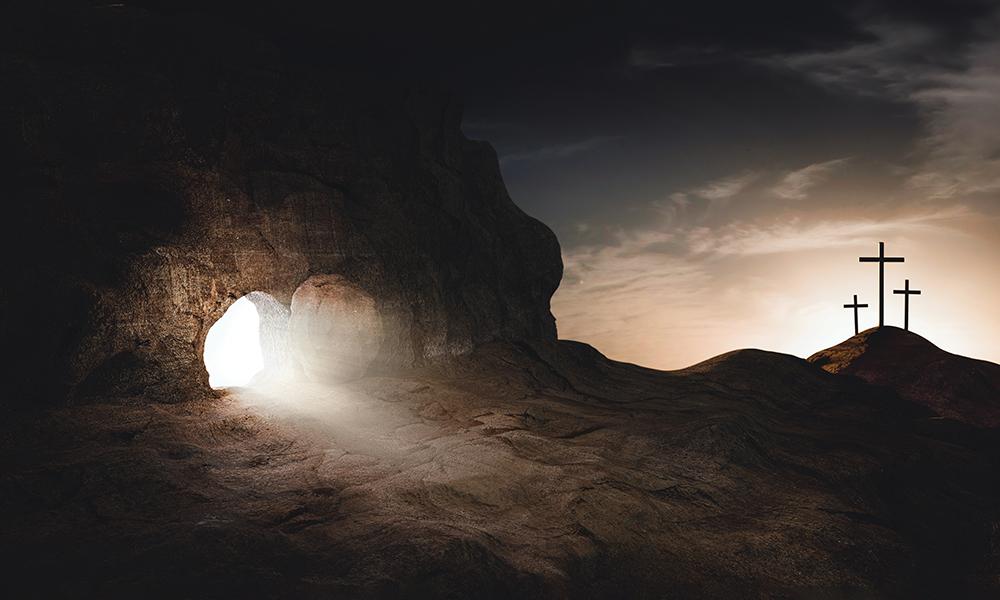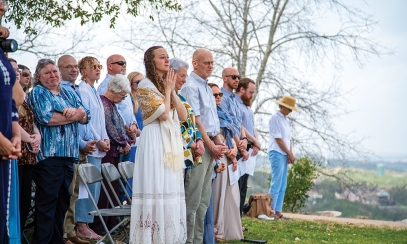
Even in the sadness of death, we must remember resurrection is coming
My heart soars during the Easter liturgies. Fragrant lilies. Thundering organ. Jubilant hymns like “Jesus Christ is Risen Today” or “This Is the Feast of Victory.” Why not pull out all the stops? Easter is Christendom’s most important celebration on this side of eternity.
My heart soars during the Easter liturgies. Fragrant lilies. Thundering organ. Jubilant hymns like “Jesus Christ is Risen Today” or “This Is the Feast of Victory.” Why not pull out all the stops? Easter is Christendom’s most important celebration on this side of eternity.
Mountaintop moments like Easter don’t come without very low moments, too. During Holy Week, we hear the account of Jesus’ passion and death, which are followed by the astonishing glory of his resurrection.
The passion story in all four Gospels includes Joseph of Arimathea stepping forward and directing the preparation of Jesus’ body for immediate burial, according to Jewish customs. Joseph of Arimathea can be considered the patron saint of those who routinely deal with death, including funeral directors, flower arrangers and grief counselors. He risked his life, and his fortune, to bury our Lord properly.
When confronted with the gritty reality of death, Joseph of Arimathea modeled courage and compassion. He “courageously went to Pilate and asked for the body of Jesus.” (Mk 15:43) In doing so, he could have come under suspicion by the Romans as an accomplice of a condemned man. He also would have revealed himself to his fellow Jews as a follower of the discredited Messiah. Neither concern stopped him. He also acted with great compassion by tending to the body of the crucified Christ on behalf of his heartbroken mother and grieving friends. Did Joseph of Arimathea have a clue that the man he buried that dark Friday would change human history forever on Easter Sunday?
Jesus’ selfless sacrifice of his own life on Good Friday is the source of our salvation. Without Jesus’ death, there could be no resurrection. The summit of our Catholic beliefs proclaims that our God is stronger than death. Just two weeks before Easter, we heard the powerful narrative of Jesus raising Lazarus from the dead. (Jn 11:1-45) That miracle previewed Christ’s resurrection after three days in the tomb.
Jesus rose on Easter morning to exist for all time and to promise the same eternal life for us. Do we really believe that teaching? I ponder that question every time I attend a funeral, which happens more often as I get older. Seeing a body in a casket or looking at a small urn containing all that remains of a loved one brings home the reality of our human mortality. Resurrection and eternal life sometimes seem unfathomable at such sad times. How will resurrection of the body happen with a lifeless corpse or a container of ashes?
Yet, we are Easter people. We have heard the truth. Just as the risen Jesus declared to Thomas who doubted, “Blessed are those who have not seen and have believed.” (Jn 20:29)
Funerals, like Good Friday, are a test of faith. It is a work of mercy to bury the dead and comfort those who mourn, like Joseph of Arimathea. Yet we must never dismiss the reality of Christ’s resurrection. His triumph over death is real!
At Easter I come ready to meet the risen Lord. And in the back of my mind will be my mother, my father, my infant son, and all those whom I have helped bury over the years. Among that communion of saints, it will be quite a celebration indeed. He is risen! Alleluia!
Louis A. Gamino is a clinical psychologist at Baylor Scott White Health and a member of St. Luke Parish in Temple. Find more about him at www.LouisGamino.com.



